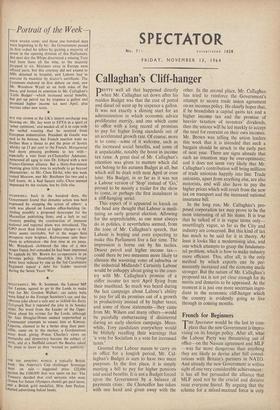Callaghan's Cliff-hanger
PRETTY well all that happened directly when Mr. Callaghan sat down after his maiden Budget was that the cost of petrol and diesel oil went up by sixpence a gallon. It was not exactly a shining start for an administration in which economic advice proliferates merrily, and one which came to office with a long record of promises to pay for higher living standards out of an accelerated growth rate. Of course, more is to come--some of it welcome, such as the increased social benefits, and some of it unpalatable, notably the hoost in income tax rates. A great deal of Mr. Callaghan's attention was given to matters which did not belong to his autumn Budget at all, but which will be dealt with next April or even later. His Budget, in so far as it was not a Labour version of 'Stop' instead of 'Go,' proved to be mainly a trailer for the show to come, or perhaps the first instalment in a cliff-hanging serial.
This 'aspect of it appeared to knock on the head any thought that Labour is medi- tating an early general election. Allowing for the unpredictable, as one must always do in politics, it nevertheless seemed, from the tone. of Mr. Callaghan's speech, that Labour is hoping and even expecting to make this Parliament live a fair time. The impression is borne out . by his tactics. Dearer petrol and higher income tax— could there be two measures more likely to alienate the wavering voter of suburbia or the industrial Midlands? Certainly Labour would be unhappy about going to the coun- try with Mr. Callaghan's promise of a stiffer income tax next April flying from their masthead. So much was heard during the last campaign about Labour's ability to pay for all its promises out of a growth in productivity instead of by higher taxes; and some of those statements—they came from Mr. Wilson and many others—would be painfully embarrassing if disinterred during an early election campaign. Mean- while, Tory candidates everywhere would be blithely recalling their warnings that 'a vote for Socialism is a vote for increased taxes.'
Granted that Labour means to carry on in office for a longish period, Mr. Cal- laghan's Budget is seen to have two main purposes. In the first place, it is simply meeting a bill to pay for higher pensions and social benefits. It is not a Budget forced upon the Government by a balance of payments crisis : the Chancellor has taken with one hand and given away with the other. In the second place, Mr. Callaghan has tried to reinforce the Government's attempt to secure trade union agreement on an incomes policy. He clearly hopes that, if he brandishes a capital gains tax and a higher income tax and the promise of heavier taxation of investors' dividends, then the unions will be led meekly to accept the need for restraint on their own incomes. Mr. Brown was telling the union leaders this week that it is intended that such a bargain should be struck in the early part of next year. There are signs already that such an intention may be over-optimistic; and it does not seem very likely that Mr. Callaghan's contribution will bring _millions of trade unionists happily into line. Trade unionists, apart from anything else, are also motorists, and will also have to pay the higher prices which will result from the new tax on transport and the increased national insurance bill.
In the long run, Mr. Callaghan's pro- posed corporation tax may prove to be the most interesting of all his items. It is true that he talked of it in vague terms only— unsettlingly vague, so far as the City and industry are concerned. But this kind of tax has much to be said for it in theory. At least it looks like a modernising idea, and one which attempts to grasp the fundamen- tal problem, which is how to make industry more efficient. This, after all, is the only method by which exports can be per- manently increased and the economy made stronger. But the nature of Mr. Callaghan's • proposed tax is not yet clear enough for is merits and demerits to be appraised. At the moment it is just one more uncertain ingre- dient in the economic cliff-hanger which the country is evidently going to live through in coming months.










































 Previous page
Previous page